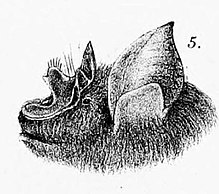Intermediate horseshoe bat

| Intermediate horseshoe bat | |
|---|---|
 | |
| Scientific classification | |
| Domain: | Eukaryota |
| Kingdom: | Animalia |
| Phylum: | Chordata |
| Class: | Mammalia |
| Order: | Chiroptera |
| Family: | Rhinolophidae |
| Genus: | Rhinolophus |
| Species: | R. affinis |
| Binomial name | |
| Rhinolophus affinis Horsfield, 1823 | |
| Subspecies | |
| Nine; see text | |
 | |
| Intermediate Horseshoe bat range | |
The intermediate horseshoe bat (Rhinolophus affinis) is a bat species of the family Rhinolophidae (“nose crest”) that is very widespread throughout much of the Indian subcontinent, southern and central China and Southeast Asia. It is listed by IUCN as Least Concern as it is considered common where it occurs, without any known major threats.[1]
Taxonomy
[edit]The intermediate horseshoe bat was described as a new species in 1823 by American naturalist Thomas Horsfield.[1] The holotype was collected on the Indonesian island of Java.[2]
Rhinolophus affinis is divided into the following nine subspecies:[2]
- R. a. affinis
- R. a. andamanensis
- R. a. hainanus
- R. a. himalayanus
- R. a. macrurus
- R. a. nesites
- R. a. princes
- R. a. superans
- R. a. tener
It varies in appearance and echolocation characteristics throughout its range, suggesting that this taxon may represent a species complex of closely related species.[2]
Description
[edit]The intermediate horseshoe bat has a total length of 58–63 mm (2.3–2.5 in), with a forearm length of 46–56 mm (1.8–2.2 in).[3] Individuals weigh approximately 12–15 g (0.42–0.53 oz).[4]
Distribution
[edit]The intermediate horseshoe bat is widely distributed throughout Asia, occurring from India and China throughout Southeast Asia.[5] It is found in Bangladesh, Bhutan, Brunei, Cambodia, China, India, Indonesia, Malaysia, Myanmar, Nepal, Thailand, and Vietnam.[1][6] The easternmost extent of its range are the Indonesian Lesser Sunda Islands and Java.[5] It is found at elevations from 290–2,000 m (950–6,560 ft) above sea level.[1]
References
[edit]- ^ a b c d e Furey, N.; Walston, J.; Kingston, T.; Hutson, A.M. (2020). "Rhinolophus affinis". IUCN Red List of Threatened Species. 2020: e.T19522A21982358. doi:10.2305/IUCN.UK.2020-3.RLTS.T19522A21982358.en. Retrieved 16 November 2021.
- ^ a b c Ith, Saveng; Bumrungsri, Sara; Furey, Neil M.; Bates, Paul JJ; Wonglapsuwan, Monwadee; Khan, Faisal Ali Anwarali; Thong, Vu Dinh; Soisook, Pipat; Satasook, Chutamas; Thomas, Nikky M. (2015). "Taxonomic implications of geographical variation in Rhinolophus affinis (Chiroptera: Rhinolophidae) in mainland Southeast Asia". Zoological Studies. 54: e31. doi:10.1186/s40555-015-0109-8. PMC 6661434. PMID 31966118.
- ^ Smith, Andrew T.; Xie, Yan, eds. (2013). Mammals of China. Princeton University Press. p. 225. ISBN 9781400846887.
- ^ Bates, Paul J. J.; Thi, Mar Mar; Nwe, Tin; Bu, Si Si Hla; Mie, Khin Mie; Nyo, Nyo; Khaing, Aye Aye; Aye, Nu Nu; Oo, Thida; MacKie, Iain (2004). "A Review of Rhinolophus(Chiroptera: Rhinolophidae) from Myanmar, Including Three Species New to the Country". Acta Chiropterologica. 6: 23–48. doi:10.3161/001.006.0103.
- ^ a b Maharadatunkamsi; Hisheh, S.; Kitchener, D. J.; Schmitt, L. H. (2000). "Genetic and morphometric diversity in Wallacea: Geographical patterning in the horse shoe bat, Rhinolophus affinis". Journal of Biogeography. 27 (1): 193–201. Bibcode:2000JBiog..27..193M. doi:10.1046/j.1365-2699.2000.00381.x. S2CID 84282300.
- ^ Kingsada, P.; Douangboubpha, B.; Ith, S.; Furey, N.; Soisook, P.; Bumrungsri, S.; Satasook, C.; Vu, D.T.; Csorba, G.; Harrison, D.; et al. (2011). "A checklist of bats from Cambodia, including the first record of the intermediate horseshoe bat Rhinolophus affinis (Chiroptera: Rhinolophidae), with additional information from Thailand and Vietnam". Cambodian Journal of Natural History. 2011 (1): 49–59.
External links
[edit] Media related to Rhinolophus affinis at Wikimedia Commons
Media related to Rhinolophus affinis at Wikimedia Commons Data related to Rhinolophus affinis at Wikispecies
Data related to Rhinolophus affinis at Wikispecies- Sound recordings of Rhinolophus affinis on BioAcoustica
